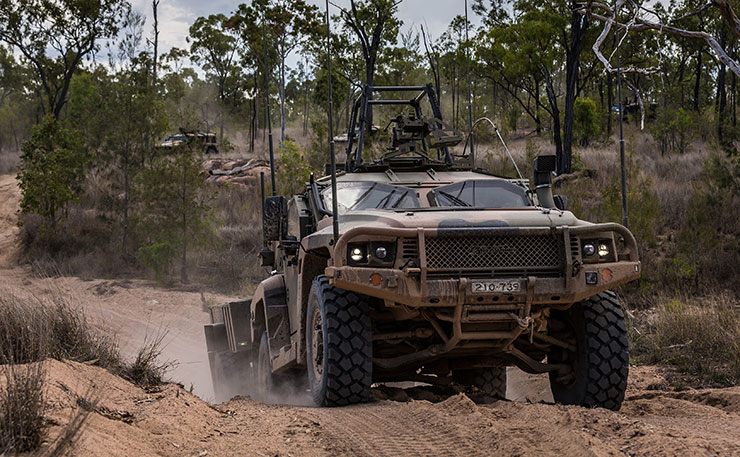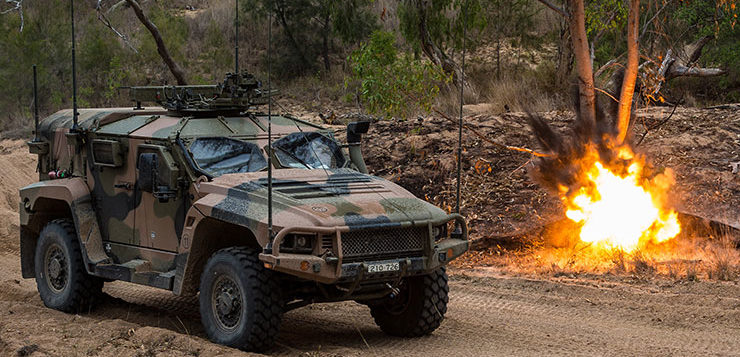International events have collided to reveal the folly of Australia’s attempts to re-badge itself as a serious player in the global arms trade, writes Stuart Rollo.
Three major news stories of recent weeks highlight the folly and shortsightedness of the federal government’s plan, announced earlier this year, for Australia to become a top 10 global arms dealer. The revelation that the attorney general blacked out findings that the Australian taxpayer was overcharged hundreds of millions of dollars for its fleet of armored vehicles, the assassination of Jamal Khashoggi, and subsequent refusal or equivocation by arms exporting states over freezing sales to Saudi Arabia, and the UN assessment that the famine resulting from the ongoing war in Yemen (the end use destination of many of these arms) is on track to become the worst in living memory, all contain dire warnings for our government.
Together, these stories demonstrate the process of erosion of governmental transparency, restriction of foreign policy flexibility, and the tragic human cost of membership in the elite ranks of the global arms trade.
The Liberal government announced the $3.8 billion dollar ‘defence export strategy’ in January this year. Under the plan, Australia is to become a major global arms dealer through favourable, state-supplied loans and grants to businesses seeking to develop and export military hardware.
The government highlighted four supposed benefits to justify this bonanza of public funds for private weapons dealers; it would bring jobs and economic prosperity, expand Australia’s foreign policy toolkit, enhance Australian defence capabilities, and support Australia’s strategic interests. The reality is starkly different.
The Australian arms manufacturing industry is neither now, nor will it ever be, a major employer of Australian workers. Its role in the labour market is small, both in terms of total jobs and relative to the revenue it generates in comparison with other sectors. As the Australian Strategic Policy Institute rightly points out in its 2018 Defence Budget Brief, there are a multitude of other industries that could provide more Australian jobs at a lower subsidy than arms manufacturing.

It is, in fact, misleading to even refer to the weapons industry in our country as ‘Australian’. Of the five biggest domestic players, four are foreign-owned. For tax purposes, they exist almost entirely offshore. Thales Australia, the French-owned multinational that colluded with the attorney general’s office to censor reports highlighting the gross inefficiency of the procurement of its Hawkei light combat vehicles, paid only $76 million in tax on over $3.5 billion income in Australia over the past three years. BAE, the British weapons colossus, made over $4 billion in Australia during the same period, and paid no tax at all.
The results in terms of jobs and tax revenue earned for Australia are unimpressive to say the least, but the impact of the close ties being formed between the arms industry and the federal government on transparency and good governance in this country are already being shown to be detrimental. This will only worsen as the industry-government ties become more entrenched, and the tail further wags the dog in terms of state policy being enacted to support corporate interests, rather than industry reinforcing the interests of the state.
The reaction of arms exporting countries to Jamal Khashoggi’s murder by Saudi government assassins has followed a fairly predictable pattern. The governments of the largest arms exporters to Saudi Arabia – the United States (accounting for 61% of all Saudi arms purchases) and the UK (23%) – have blankly refused to freeze arms sales. The Saudi’s third largest source of arms is France, accounting for 3.6% of their total. French President Emanuel Macron initially rebuffed calls to freeze arms sales as ‘pure demagoguery’, but has since supported a united European policy on arms exports to the Kingdom.
Several other leaders of smaller exporters have flirted with the idea of halting arms exports, including the Australian government. But, the numbers demonstrate that the greater the sales, the more reluctance to risk them for diplomatic leverage. Rather than ‘expanding the foreign policy toolkit’, arms deals drastically restrict freedom of diplomatic movement. In a global market within which arms manufacturers leverage political influence through highly-paid coteries of lawyers and lobbyists, and governments constantly fear losing market share to strategic rivals, the diplomatic power lies firmly with the buyers.
And it is the buyers that should worry us. The Australian government has identified the Middle East as a ‘priority market’ in its plans for increasing our arms exports. Three of the world’s four largest arms importers over the past five years are the main aggressors in the war on Yemen. Saudi Arabia, Egypt, and the United Arab Emirates, all brutal and authoritarian regimes that rank at the bottom of both the Economist’s ‘Democracy Index’ and Freedom House’s ‘Freedom in the World’ index, are the architects of the famine that the UN projects is putting the lives of 14 million Yemenis at risk.
Al Qaeda, acting in coordination with the Saudi-led coalition, now controls vast swathes of Yemeni territory. Cycles of violence, the spread of terrorism, and the creation of millions of refugees are the result of wars in these ‘priority markets’.
More suffering in the Middle East is not in Australia’s strategic interest. Becoming a major player in the global arms trade will only worsen this cycle of war. This policy needs to be loudly challenged now, while still in its early stages, before the corrupting role of the arms trade on Australian democracy and foreign policy becomes a fait accompli.
Donate To New Matilda
New Matilda is a small, independent media outlet. We survive through reader contributions, and never losing a lawsuit. If you got something from this article, giving something back helps us to continue speaking truth to power. Every little bit counts.




